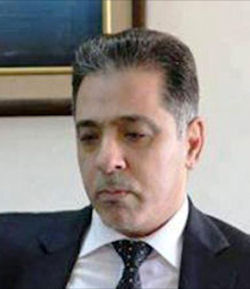Mohammed al-Ghabban / Muhammad al-GHABAN
 On 18 October 2014 Iraqi lawmakers approved the critical security posts of defense minister and interior minister in Prime Minister Haider Al-Abadi's government, completing the formation of a new cabinet amid the fight against the Islamic State group. Parliament voted in Khaled al-Obeidi, a Sunni lawmaker from the northern city of Mosul, as the new defense minister. Mohammed al-Ghabban, a Shi'ite lawmaker from a powerful political bloc, was elected interior minister.
On 18 October 2014 Iraqi lawmakers approved the critical security posts of defense minister and interior minister in Prime Minister Haider Al-Abadi's government, completing the formation of a new cabinet amid the fight against the Islamic State group. Parliament voted in Khaled al-Obeidi, a Sunni lawmaker from the northern city of Mosul, as the new defense minister. Mohammed al-Ghabban, a Shi'ite lawmaker from a powerful political bloc, was elected interior minister.
The newly appointed Interior Minister, a little-known Shia politician who just happens to be allied with the Badr Organization, said he was determined to cleanse Iraqi security ranks of ‘sectarian elements’ and build national security organs. The ministry Ghabban leads is accused of building security organs on the basis of sectarian affiliation.
He had held leading posts within the Badr Organization, and is close to the organization’s leader Hadi al-Amiri, whose nomination to the post was opposed by the United States. Prime Minister Abadi won praise from Sunnis for resisting the candidacy of the Badr Organization’s chief, Hadi al-Ameri. Badr officials, however, threatened to withdraw from the government if one of their members was not nominated for the post.
Ghaban was a last minute candidate whose name was proposed after the assassination of Ahmed al-Khafaji, a leader in the Badr Organization, who was nominated to the post following a secret agreement between Hadi al-Amiri and Haidar Abadi, which was leaked to the media after Khafaji’s death. Da'esh [ISIS] forces killed Badr parliamentarian Ahmad al-Khafaji in a suicide bombing at a checkpoint in Baghdad.
Federal police and security organs are tainted with sectarian tendencies and mired in corruption. The heavy-handed policies Iraqi security forces pursued mainly in predominantly Sunni areas are reported to have caused mounting resentment of the government and pushed many Sunnis to welcome Islamic Sate militants in their areas.
The Iraqi prime minister pledged 29 January 2015 an urgent investigation into accounts that Iraqi security forces and Shia militias gunned down dozens of unarmed villagers after fighting with the Islamic State of Iraq and the Levant (ISIL) group. Mohammad Salem al-Ghabban, Iraq's interior minister, led the investigation. Shia armed men accompanied by Interior Ministry SWAT teams and Iraqi soldiers rounded up men in the Sunni village of Barwana. After accusing them of belonging to ISIL, survivors said they were marched to a nearby field where the armed men took away men from the group, and shot them behind a wall. More than 80 civilians were shot dead.
Media reports suggest that the head of Badr’s militia, Hadi al-Amiri, will likely wield the real power at the Ministry. Sunnis opposed putting the Badr Orgamnization at the head of internal Iraqi security. The appointment undermined Abadi’s mandate to form an inclusive government in order to boost Sunnis’ confidence in the central government.
“There is no difference in substance having al-Ghaban instead of al-Ameri,” Kirk Sowell, the editor of Inside Iraqi Politics newsletter, told Alexander Whitcomb writing for Rudaw. “The optics are better, but in substance there is no difference. Every person in this organization obeys Ameri, who works for Iran, and now controls Iraq's national police force.” Whitcomb noted that "the last time a Badr member held the interior post was in 2005-2006, in the lead up to full-scale sectarian civil war. At the time Badr death squads acted with impunity and were accused of murdering thousands of Sunnis."
|
NEWSLETTER
|
| Join the GlobalSecurity.org mailing list |
|
|
|

